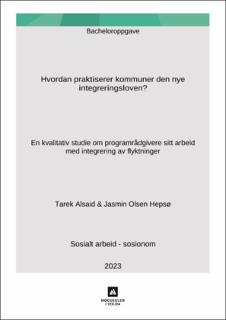Hvordan praktiserer kommuner den nye integreringsloven? En kvalitativ studie om programrådgivere sitt arbeid med integrering av flyktninger
Abstract
Det er kommunene som er ansvarlig for bosetting og integrering av flyktninger. I den enkelte kommunen er det programrådgivere som er ansvarlig for oppfølging og veiledning av deltakerne i introduksjonsprogrammet. Den 1.1.2021 trådte den nye integreringsloven i kraft, som blant annet innebar store endringer opp mot introduksjonsprogrammets varighet. Studien tar for seg programrådgivernes arbeid med flyktninger som etter den nye integreringsloven kun har rett på seks måneder med introduksjonsprogram. Lovendringens nedkorting av programtid har blitt mye omdiskutert, både før og etter loven ble iverksatt. Med utgangspunkt i dette har vi undersøkt hvordan programrådgivere praktiserer den nye integreringsloven, og hvordan de håndterer integreringsarbeidet opp mot denne gruppen flyktninger. Studien er avgrenser til fire kommuner i Møre og Romsdal. Gjennom empirisk metode har vi innhentet data fra fire programrådgivere, en fra hver kommune, og analysert funnene opp mot oppgavens teoretiske grunnlag. Intervjuene ble systematisert etter forskningsspørsmål, hvor vi har sett på utfordringer i arbeidet, samt programrådgivernes rolle og egen opplevelse av integreringsarbeidet. Analysen viser tydelige utfordringer knyttet til tid og ressurser, i den grad at programrådgiverne ikke strekker til i arbeidet. Samtidig kommer det tydelig frem at programrådgiverne har utviklet gode håndteringsmekanismer i arbeidet. Med mange arbeidsoppgaver og krysspress i rollen som bakkebyråkrat er programrådgiverne avhengig av å pendle mellom ulike roller i arbeidet, noe de ses å mestre godt. Når det gjelder programrådgivernes opplevelse av arbeidet ser vi stort engasjement og ønske om å bidra til god integrering av flyktninger. Samtidig opplever de samarbeidet med Nav som problematisk. De funnene vi sitter igjen med viser tydelige håndteringsmekanismer i arbeidet, til tross for de begrensningene som settes av arbeids rammevilkår. Programrådgiverne har stort handlingsrom og frihet til å utøve skjønn, som gjenspeiles i måten de tilnærmer seg arbeidet. Abstract
It is the responsibility of municipalities to settle and integrate refugees. In each municipality program counsellors are responsible for the follow-up and guidance of participants in the introduction program. On January 1, 2021, the new integration act came into force, which involved significant changes regarding the duration of the introduction program. The study examines how program counsellors work with refugees who, after the new integration act only have six months of the introduction program. The shortening of the introduction program has been widely debated, both before and after the law came into force. Based on this, we have investigated how program counsellors practice the new integration act, and how then handle their work towards this group of refugees. The study is limited to four municipalities in Møre og Romsdal. Through empirical methods, we have collected data from four program counsellors, one from each municipality, and analyses the findings based on the study’s theoretical foundation. The interviews were systematized after our research questions, where we looked at challenges in the work, as well as the program counsellor’s role and their own experiences of the integration work. The analysis shows challenges related to time and resources, to the extent that program counsellors are not able to cope with their workload. At the same time, the program counsellors have developed good coping mechanisms in their work. With many tasks and conflicting pressure in their role as a street-level bureaucrat, program counsellors need to shift between different roles in their work, which they seem to manage well. When it comes to the program counsellors experience of the work, we see great engagement and a desire to contribute to good integration of refugees. At the same time, they experience cooperation with Nav as problematic. The findings we are left with shows clear coping mechanisms in the work, despite the limitations set by the work framework. Program counsellors have significant leeway and freedom to exercise discreation, which is reflected in the way they approach their work.
